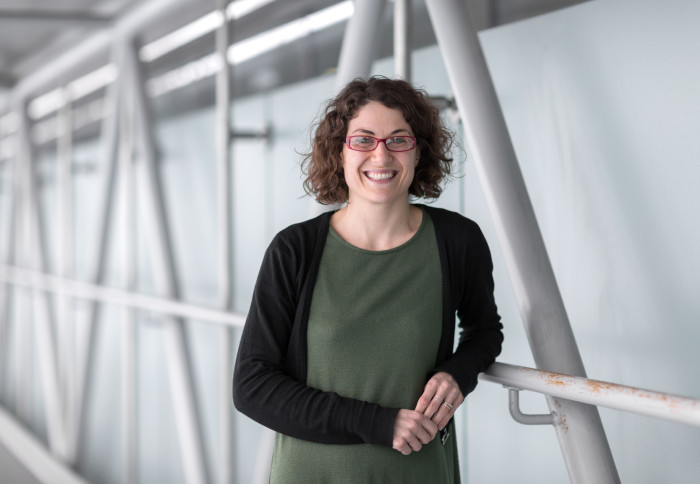Excellence in Animal Research celebrated with 2020 Provost Awards

Dr Anna Napolitano, winner of the public engagement award
Three individual staff members and one team have been recognised in the Provost’s Awards for Excellence in Animal Research.
The award scheme was established to celebrate good practice by researchers and Central Biomedical Services (CBS) staff at Imperial.
Imperial's provost, Professor Ian Walmsley, said: “From developing innovative surgical techniques to enhancing communications about the role of animal research at the College, this year’s winners have played important roles both in their research groups and teams, and also in the wider College community and beyond.”
Refinement, reduction and replacement
Three winners were recognised for their implementation of the ‘3Rs’ in their work with animals – refining the way research is conducted on animals, reducing the number of animals needed, and replacing animals with other research techniques where possible.
 Dr Nicoleta Baxan, Manager and MRI Physicist, was recognised for the key role she played at Imperial's Biological Imaging Centre (BIC) in successfully implementing the 3Rs into all projects. She said: “I enjoy working at the BIC as the work is challenging and varied, reflecting a multidisciplinary research environment. The collaborative nature of research allowed me to work closely with scientists and clinicians from different departments, as well as BIC members and CBS staff, on more than 30 MRI projects.
Dr Nicoleta Baxan, Manager and MRI Physicist, was recognised for the key role she played at Imperial's Biological Imaging Centre (BIC) in successfully implementing the 3Rs into all projects. She said: “I enjoy working at the BIC as the work is challenging and varied, reflecting a multidisciplinary research environment. The collaborative nature of research allowed me to work closely with scientists and clinicians from different departments, as well as BIC members and CBS staff, on more than 30 MRI projects.
“I always tried to integrate the appropriate imaging component into every research project, making sure that experiments are properly designed. I have helped collaborators to set up detailed imaging protocols, data acquisition, analysis and interpretation of results, aiming to establish standardised imaging techniques and a uniformed imaging database which can be applied to characterise different disease models.
“The imaging techniques which I established will provide enormous opportunities to homogenise data acquisition and computation which can be expanded to other animal disease models, and potentially shared between research groups. As a result, a greater amount of information can be derived from smaller number of animals, which in turn will increase the statistical validity by reducing the experimental variation.”
Aldara Martin Alonso, a PhD student in the Department of Metabolism, Digestion and Reproduction, was recognised for her work refining a surgical technique in mice that allows unprecedented insights into the function of the vagus nerve – the major neural link between the gut and the brain.
Led by Yat Patel, also a PhD student in the Department of Metabolism, Digestion and Reproduction, the Glucose Clamp Team is the final winner to be recognised for application of the 3Rs in current or recent work. The technique set-up by the team is the gold standard methodology for measuring aspects of beta-cell response during glucose metabolism, and it reduces the number of animals needed per study.
Yat said: “The technique is a way to establish the secretory function of the pancreas, which is crucial to research on diabetes. I have worked on the project alongside Anna Roberts, a fellow PhD student, with the support of our supervisors Dr Victoria Salem and Professor Kevin Murphy.
“We also had help from the CBS team. Dr Alastair Gallie, one of the vets, played a crucial role in helping us develop aseptic techniques and protocols for post-operative care. Phil Rawson, one of the Named Animal Care and Welfare Officers, helped us to manage the study and the post-operative animal care.
“After all the work of getting the technique set up properly, we’re now actually getting experimental results, which is great. I studied neuroscience before I started my PhD here, and I have already been thinking about using the technique to study neurodegenerative diseases.”
Engaging the public
Dr Anna Napolitano, CBS, was recognised with the public engagement award for her significant commitment to enhancing communications about the role of animal research at the College. Anna spearheaded the introduction of the 3Rs Reddit Research Forums, which allow the public access to world leading researchers and give them a chance to ask questions about their research involving animals.
Anna’s work in increasing openness around animal research led to the College issuing a set of guidelines and heading a working group to help guide European universities to make similar positive steps towards openness.
Article text (excluding photos or graphics) © Imperial College London.
Photos and graphics subject to third party copyright used with permission or © Imperial College London.
Reporter
Elizabeth Nixon
Communications Division